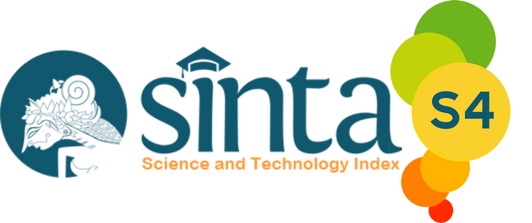Dampak Program Pekarangan Pangan Lestari Anggota KWT Jaya Mandiri Abadi di Kalurahan Tridadi Kapanewon Sleman Kabupaten Sleman
Abstract
Keywords
Full Text:
PDFReferences
Adlini, M. N., Dinda, A. H., Yulinda, S., Chotimah, O., & Merliyana, S. J. (2022). Metode penelitian kualitatif studi pustaka. Edumaspul: Jurnal Pendidikan, 6(1), 974–980. https://doi.org/10.33487/edumaspul.v6i1.3394
Astuti, D. I., Saraka, S., Winarti, H. T., Lukman, A. I., & Mustangin, M. (2022). Analisis pemberdayaan perempuan berbasis keterampilan budidaya tanaman hidroponik. Masyarakat Madani: Jurnal Kajian Islam dan Pengembangan Masyarakat, 7(2), 52. https://doi.org/10.24014/jmm.v7i2.17262
Badan Pangan Nasional. (2022). Indeks Ketahanan Pangan 2022. Tersedia dari https://badanpangan.go.id/storage/app/media/2023/Buku%20Digital/Buku%20Indeks%20Ketahanan%20Pangan%202022%20Signed.pdf
Edi, S. (2021). Utilization of the yard to support family food security in the pandemic time of Covid-19. IOP Conference Series: Earth and Environmental Science, 782(4), 042023. https://doi.org/10.1088/1755-1315/782/4/042023
Fadilla, A. R., & Wulandari, P. A. (2023). Literature review analisis data kualitatif: Tahap pengumpulan data. Mitita Jurnal Penelitian, 1(3), 34–46. Tersedia dari https://jurnalmitita.univpasifik.ac.id/index.php/mjp/article/view/47
Larasati, P. D., Sukristyanto, A., & Novaria, R. (2023). The spirit of society journal development of family based food security policy program evaluation model in the sustainable food yard (P2L) Program in Tuban District. International Journal of Society Development and Engagement The Spirit of Society Journal, 6(2), 181–194. https://doi.org/10.29138/scj.v6i2.2213
Novanda, R. R., Muflihani, A. R., Priyono, B. S., Nabiu, M., Irnad, I., Aprian, R., ... & Defliyanto, D. (2024). Pekarangan dengan prinsip kawasan rumah pangan lestari di Desa Pantai Indah Pulau Baai Kota Bengkulu. Dharma Raflesia: Jurnal Ilmiah Pengembangan dan Penerapan IPTEKS, 22(1), 27–39. https://doi.org/10.33369/dr.v22i1.34333
Putir, P., Nuwa, N., Madiyawati, M., Koroh, D. N., & Firdara, E. K. (2022). Optimalisasi lahan pekarangan sebagai rumah pangan lestari melalui pendampingan pemberdayaan masyarakat di Kecamatan Jekan Raya Kota Palangka Raya. Bubungan Tinggi: Jurnal Pengabdian Masyarakat, 4(1), 21–29. https://doi.org/10.20527/btjpm.v4i1.4408
Qomariah, R., Lesmayati, S., Susilawati, & Awanis. (2022). Food yard program in urban and rural areas of South Kalimantan. E3S Web of Conferences, 8, 03022. https://doi.org/10.1051/e3sconf/202236103022
Riajaya, H., & Munandar, A. I. (2020). Strategi peningkatan ketahanan pangan dalam meminimalisasi stunting di Kabupaten Sukabumi. Jurnal AGRISEP: Kajian Masalah Sosial Ekonomi Pertanian dan Agribisnis, 19(2), 255–274. https://doi.org/10.31186/jagrisep.19.2.255-274
Silondae, H., Lintang, M., & Amiruddin, A. (2021). Use of yard land as a source of nutrition and family economy during Covid-19 pandemic. IOP Conference Series: Earth and Environmental Science, 807(2), 022001. https://doi.org/10.1088/1755-1315/807/2/022001
Wibowo, E. T. (2020). Pembangunan ekonomi pertanian digital dalam mendukung ketahanan pangan (Studi di Kabupaten Sleman: Dinas Pertanian, Pangan, dan Perikanan, Daerah Istimewa Yogyakarta). Jurnal Ketahanan Nasional, 26(2), 204–228. https://doi.org/10.22146/jkn.57285
Widayati, W., Abdullah, W. G., Romantiaulia, W. I., & Mihrad, E. S. (2021). Local wisdom of muna community in utilizing of yard as family food security. IOP Conference Series: Earth and Environmental Science, 782(3), 032018. https://doi.org/10.1088/1755-1315/782/3/032018
Refbacks
- There are currently no refbacks.






